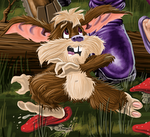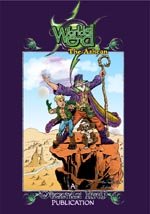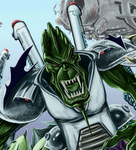Okay Guys,
It's been a few days since my last post and although there are a few things I would like to talk about the only thing ready (and this has been waiting in the wings for a while now) is the little missive you may be about to read.
Things are manic here at the Keep at the moment as we all try to meet the deadlines to make Bristol a great opening for our first showing at a major Comics Convention, so it may be a while before I can write anything new.
With that in mind this Blog may take a month to read, anyhow. Now especially for my good buddy, colleague and fellow Blogger from the good old US of A Charles Yoakum, I have tried to ensure there is enough breathing space between paragraphs. Sorry I couldn't supply the coffee, tea and croissants, Charles, this time around...maybe next time.
;))
In my role working with schools and colleges over the past two or three years I have observed something, something which has shown itself to me before in my past observations of the reading habits of kids here in the UK over the last at least ten years or so.
The following are my thoughts on the matter. This is a subject dear to my heart and something I hope will be examined and rectified very soon, here in the UK.
There is a growing need for Literacy to be made entertaining within our schools. Countless, surveys and reports indicate that there is an increasing number of children leaving school at sixteen, to either gain employment or go onto further education with little or no literacy and numeracy qualifications at all, and Colleges up and down the UK are struggling to cope with this increase in students requiring essential skills teaching in these subjects.
One teaching aid, which up to present has remained, at best, a well-guarded secret is now infiltrating schools and libraries up and down the land. First they appeared in the country’s libraries and now hopefully they are going to spread into schools, both primary and secondary.
What is this teaching aid and can it really make a difference?
From the early part of last century or at least the nineteen-thirties this country’s children read comics. At the time and still predominantly in the general viewpoint of both the man in the street and the educators they were at best juvenile fair and read by those of a semi-literate reading capability.
This ignorance in the potential effectiveness of the graphic narrative as a means of learning is something quite unique to both the UK and the USA. In Europe and the Far East the opinion is different and comics are looked on completely differently to this with due respect given to both the writer and artist, who are looked on as the “Author and the Artist”. Whereas here in the UK and also in the USA the as yet untapped potential of the comic and now graphic novel as a teaching aid to all ages is being dismissed still.
Children no longer read comic books according to more surveys and reports conducted by those in the know. The viewpoint of the man in the street and the educators, regarding the comic book and it’s format are basically still the same, but the untapped potential of the material is starting to see inroads to libraries and now slowly schools because of the graphic novel format…after all it looks like a book and you can buy them in a book shop and see them in libraries.
Well, with this mindset in view, it is time to move the format forward and discover the rich tapestries within their pages.
Four facts:
- Most children here in the UK no longer read comics due to numerous reasons, but primarily they are no longer the cheap throw away commodity they once were and are expensive.
- American import comics are unavailable to them except through specialist comic shops, but even then most are not produced with children in mind.
- In general here in the UK children do very little reading at all
- Schools and Colleges have an increasing problem with literacy
With these three things in mind we have an almost blank canvas to work with and as such the inroads are there to be made. Already a number of new and also some established publishers are making moves to produce graphic novels using the classics as the basis for the story content.One such publisher Classical Comics, are busily producing a series based on the texts of William Shakespeare, Emily Bronte, Mary W. Shelley and Charles Dickens amongst others.
The idea is to produce three versions of each book:A Quick text for new readers
A Street text for contemporary readers
A Full text with all the dialogue and captions from the originals
These are being pushed through the media into up-market bookshops, libraries, and through this strategy into schools.
It is highly possible to go one better and provide a scheme of work whereby graphic narratives could be run on any curriculum subject, making the text as basic or as complex as necessary for the reader(s) in question, pretty much in line with how Japan operates with its Manga books. In Japan there are books on any and every subject from house cleaning, stamp collecting and cooking to car maintenance, child rearing, and the rights of the law, all in the form of a comic book.
The first thing we need to do is get rid of the notion in people’s minds that comics are only for kids and folks that cannot read properly, if at all, and get everyone to see the untapped potential of this art form. After all what does it matter what resource materials are used as long as the children begin reading at length again?
The potential to explain extremely complex concepts through a graphic narrative is huge and plain to see. Using the same kind of template, as Classical Comics there could be several levels of reading standards at all key stage levels with key curriculum subjects.
English, Maths, Science, History and Geography could be the core group with other subjects following suit when appropriate, or subjects could be given the graphic novel treatment at key stages throughout the year.
Maybe one potential to experiment here would be to hold a week long series of lessons utilising the graphic narrative way of learning, much like the “Fun Days/Weeks” already in place in many schools.
It is a well-proven fact that a great many people remember facts pictorially in their memories and so as most textbooks are just that, this may hinder some. If the key facts were covered by graphic narrative format then maybe more children would be able to retain key facts. Experimentation has taken place in the past to this effect, with people having their memories trained by professionals to aid them in remembering things far easier. The best example of this is the “List Test”, using word – image association. People with very little capacity to remember long lists of products, dates, times, teams, etc, all faired incredibly well during these tests, once they had been given strategies to cope with and manage the mass of information.
With this in mind, the graphic narrative, that is not just telling the student about the subject matter, but also showing it, is creating more potential for students to retain the memory of the imagery and thus the facts about the subject.
It would also be possible to create strategies for teaching the classroom teacher how to create basic original graphic narratives regarding basic key curriculum issues. This could also be a cross curricular event, with the artistic students producing the graphical interpretation and the script originating from the classroom teacher, based on the actual text and here too, some of the other students could also help.
The production of work by students in this way would afford them the opportunity to put down on paper in a visual way the events of any such project. E.G.: A number of students are taking part in a science project within school, nothing to do with art…but that is where we need to shift our focus and re-evaluate our position as educators. There has to be more emphasis on cross-curricular studies to enable students to be able to put things into perspective and see how all the subjects interlink at some stage in the game. The students in the science project would then put down in, graphical terms, what they have just done in the lesson. Just like writing about something you have just done makes you think things through and helps with the retention of the information as a result, so too would the production of what would normally be a textural write up as a graphical exercise. The children have just done such and such experiment and they would then go away and put that event into words and pictures instead of just words.
In the main though for this to work to its full potential then the graphic narratives need to be professionally created. Even if the material is not curriculum based there is no reason why the students cannot be allowed to read, quality, well written, well drawn graphic novels/comics to enable them to read better. The list needs to be vetted, much like the libraries do now, so that undesirable works do not slip through the net, and this mainly pertains to potential unsuitability for the reader’s age and/or abilities, but it can also mean content as well.
One negative, which will need to be overcome, is the fact that people do not, in the main, like change. This said the unlimited potential provided by these new vessels of information could provide excellent opportunities for some students that learn by visual means to attain better results through working in this way.
Change is inevitable, however, that is, if we want to start to progress again, otherwise we will continue in this downward spiral with children continuing to go about life without reading in any shape or form. We have to initiate change as soon as possible to prevent the former scenario from happening.
Anyone wishing to take a look at the new graphic novels from Classical Comics can do so at:
http://www.classicalcomics.com/
Anyone wishing to speak at greater length on this subject or to book me into your school can do so by emailing me at:
mail@wizards-keep.com
Until next time have fun!
Tim Perkins…
April 5th 2008












































4 comments:
Hey Tim,
That's an awesome point, and one that I'm glad someone is talking about.
I don't really have my hand on the pulse of education over there or here in the states, for that matter.
However, I have noticed that spelling is not a strong subject(even in some mainstream comics). I think part of it may be due to the shortcuts derived from text messaging.
**I hope that someone reading this blog can forward it to educators, on both sides of the oceans, so that something positive can come of it. I will try to pass it on to some educators that I know.
Thank you.
Hi Emilio,
Sorry for the delay in answering, but things are just so manic here at the moment.
Anyhow, thanks so much for your very kind words. It is something very dear to my heart and I try and do as much as I can when I am able to get into the schools and colleges. I have written several Blogs on this subject over the past twelve months and one touched on that very subject about differentiating between text speak to text a quick message to someone you know, but when you see applications and stuff doing the same...that's sadly down to a total lack of understanding of how the English language works.
If you haven't seen this post from last year, this, may be of interest too:
Wizards Keep - The Tim Perkins Blog Entry:
Thursday, December 13, 2007
Literacy and life in the 21st Century…
A look at some of the problems facing young folks today…
Thanks for offering to pass this on to the educators you know. I really hope we can make a difference.
I find it so sad that there are kids and folks of all ages that have never read a book in their lives.
That means they have never visited the many magikal places we may have in our readings and to me that is a crime in itself!!!
Thanks again for taking the time to read the piece, I realise it is lengthy and also and more so for making a comment about it.
Best Wishes,
Tim...
;))
Excellent post Tim! I think you've hit the nail on the head. Comics helped my reading a great deal when I was little and subsequently I was ahead of other children in reading ability at infant school. The combination of words and pictures is both entertaining and mentally stimulating.
The fact that standards of literacy have fallen in the UK on a parallel with the decline of the British comic can't be dismissed as coincidence. Unfortunately the British attitude to comics (as trash) means this situation is something that most people won't consider seriously. Sad to say that none of my friends' children read comics.
Post a Comment